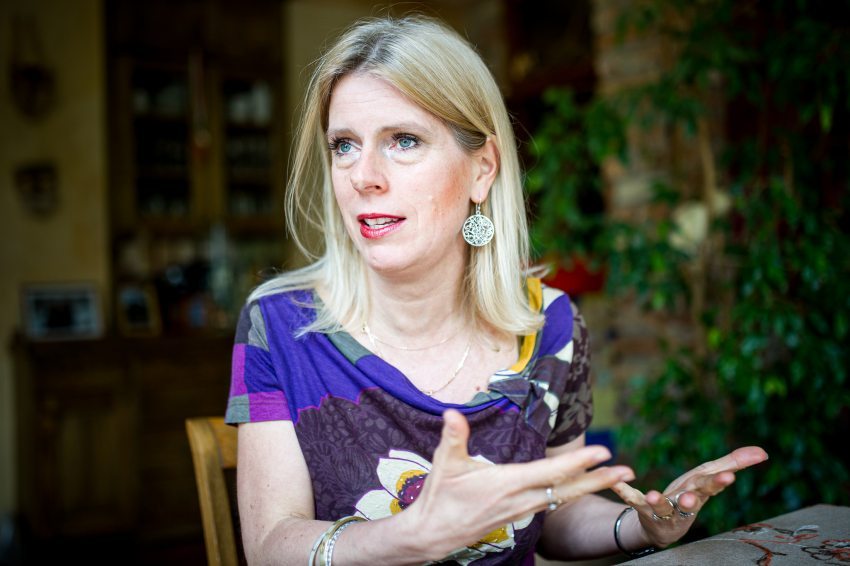Diána Ürge-Vorsatz, climate researcher: “People don’t even grasp that ‘many a little makes a mickle’”
There are few more divisive subjects than climate change: some even deny its existence, while others envisage the coming of the end of the world. At the EU climate summit in June, Hungary refused to undertake a switchover to renewable energy by 2050. Many view this decision as meaning that everything is important, just not the future. With regard to the EU summit, we took the opportunity of chatting about the room for manoeuvre in decision-making of small countries, among other issues, with climate researcher Diána Ürge-Vorsatz, professor at the CEU and a vice-chair of the Intergovernmental Panel on Climate Change.

You are a mother of seven children. How did you go about explaining what happened at the EU climate summit to your children?
“Although we often talk about environmental protection and climate change, we don’t deal with current political issues at the dining table, thus this subject has not yet been aired. Our oldest child is 20, the youngest is five: two of the older ones are actively engaged with environmental protection as volunteers.”
You arrived for the interview after competing in an orienteering race. While you are running, do you at least think about those invasive, climate-dependent species such as the tiger mosquito and tick?
“For sure! The problem is that not only are ticks spreading, but the diseases they transmit as well. I’ve pursued this sport for decades, I’ve had countless tick bites, although last year was the first time I contracted Lyme disease, and my son as well. Nowadays, every second tick is infectious. A very great fellow athlete of mine nearly died from West Nile fever, even though as one of the best orienteerers in Hungary, his immune system is very strong.
“By 2025, Hungary will be the second most infected country in the EU in terms of West Nile fever – this is one of the prognoses of the European Environment Agency, which I knew well but never would have thought that this would concern me so closely!
“And this is just a foretaste of what is to come.”
Today, we are at warming of one degree. Why does a single degree matter?
“Measured against the age of the Industrial Revolution, globally this one degree is correct. In Hungary, currently we are looking at an average warming of 1.6 degrees compared to 1980.”
At exactly what level would we like to bring warming to a halt?
“At one and a half degrees – in terms of global warming, since the rise in the thermometer is not shared equally. The centres of continents, where Hungary is located, warm one and half to two times more than in coastal areas. In other words, in the long term we are worse off, even though luckily we have not yet experienced truly extreme weather phenomena.
“Many say: we’re going crazy over just one degree?! We are not even going to notice it! However, in Budapest over the past 15 years the number of heatwave days adds up to an entire month. Last year it was a real sensation if somebody swatted a tiger mosquito somewhere, and now they are in our gardens.
“Invasions of stink bugs and harlequin ladybirds were just unpleasant, but image if we have a plague of a species that destroys our entire year’s crops, or that is hazardous to our health. It is not a question of the human species being driven to extinction but rather that our civilization is in danger, because it is finely attuned to climate and even a small upset can spark a major disaster. Just remember that the supply of domestic potatoes had run out in January. Many were paying HUF 400 per kilo for cabbages, carrots, onions, but what will happen if we are absolutely incapable of growing those plants on which our entire diet and nutritional culture is based?”
In the meantime, the waiter has brought the lemonade, complete with drinking straw because we were not on the ball. Is it actually worth paying attention to such trivialities when the serious environment pollution is caused by flying?
“If everyone were to throw out just one plastic cup a day in Hungary, one could build out of these every single day a tower thirty times the height of the Mátra Mountains. People don’t even grasp that ‘many a little makes a mickle’. At the same time, undoubtedly there are also more serious issues when it comes to climate change.”
Many were shocked that at the most recent EU summit the Visegrád countries vetoed the net-zero emissions climate target for 2050, saying that the compensation conditions on commitments had not been properly worked out. Many view this decision as meaning that there is money for everything, just not for the protection of the future. How much room for manoeuvre do you think small countries have?
“I hope that this is not the final act. I am really confident that Hungary can stand at the head of climate protection in certain respects. Positioning within the EU may have played a role in our not undertaking net-zero emissions by 2050 this time. This is politics, so it is not in my remit. But the fact that the Hungarian electorate does not expect its politicians to take radical steps in the matter of climate change may also have played its part.
“Another reason may be that we didn’t tie our economy in the best direction when we committed ourselves to the auto industry, since those countries for which the traditional vehicle industry is important can easily become a hindrance for net-zero emissions, as Germany sometimes is. Europe lags behind China, Japan, South Korea, indeed it is also behind the USA in terms of electric car manufacturing, and we are not going to be able to make up for this shortfall.”
Would this be the reason that net-zero emissions by 2050 appear, as a target, impractical?
“It is not an easily fulfillable target, that’s certain. In Hungary, there are none of the necessary impact studies to show how this could be achieved, nor are there in most other parts of Europe. The IPCC has already drafted the relevant analyses. A large number of research centres have shown the many different ways it is possible to reach these targets, yet these studies remain at the global level and are not broken down to individual country level.
“Those countries that said yes to net-zero carbon emissions in all likelihood reached those decisions as a political ‘yes’ and not as a worked out, scientifically-based ‘yes’ underpinned with an economic plan. However, the entire Paris Accord is like this: the one and a half degrees as a limit that found its way into the final document was done when science didn’t even dare give this cut-off level. If any colleague of mine had stated such a thing at the time, he or she would have been branded a dreamer.”
So are you saying that this limit was added to the text of the accord by accident?
“No, it became a political goal because those small island nations who may find themselves submerged with warming of two degrees forced the world to face a moral decision. But at that time, we didn’t know whether it was worth fighting for one and a half degrees and what the different between one and a half and two degrees would be. This is why the climate summit asked the IPCC to draft the scientific report that was published last October and answer the following questions: is the target achievable or not, and if so, how can it be achieved and how much will it cost? Is it worth busting ourselves over half a degree?”
Please sum up what they concluded.
“The first and most important assertion is that it is worth making the effort, the train has still not left the station, global warming can be brought to a halt at around one and a half degrees. And there is a huge difference between one and a half and two degrees: for example, this half a degree doubles the number of those suffering from water shortages.
“Dozens of models have shown that warming can still be halted, and what is more, in many different ways so that in the meantime we don’t all have to return to the cave.
“Although every path assumes huge change, it transpires that we won’t be crippled even economically speaking. According to researchers, maintaining the one and a half degrees will cost seven percent of growth in consumption until the middle of the century. Until then, we expect global GDP growth of 300%, from which we would have had to devote this seven percent – we wouldn’t even notice it! Climate catastrophes take a lot more than this because, for example, the 2017 hurricane season cost four percent of the US’s GDP.”
At the end of May, there was a preparatory conference in Szeged for the ongoing Hungarian national climate report, which you were also involved in. The consultation was established under the aegis of the Ministry for Innovation and Technology headed by László Palkovics. What is the significance of this?
“Changes are so rapid that science is barely able to keep up with them. Research labs function in such isolation that there are enormous benefits and huge opportunities to be gained from connecting their work: a philosopher, an axiologist, an expert on drought and a climate physicist finally all sat down together at the same table. This allows us to be a little bit more scientific in establishing, on the one hand, what can be expected, and on the other hand, what we can do because there is still much to discover in this field. For example, there has not been any real research on what will happen in cities and how we can defend ourselves, but principally, how will we be able to shape the economy so that we even come out winners from the transformation.”
How could we be winners in the struggle against climate change?
“Nowhere in Europe is there such a boom in the building industry as here, and there are even more opportunities inherent in building restoration than in new builds. The whole of Europe suffers from having an outdated, energy-inefficient building stock. Upgrading buildings one by one is expensive and tricky. In the Netherlands they have already started getting organized in this area, but it is not too late to brainstorm about how it would be possible to categorize buildings, and come up with solutions, so that zero energy renewal could be resolved without the need to move residents out. From this point of view, upgrading tower blocks is easier. The only trouble is that a good many of them have already been renewed so as to achieve 20-30%, maximum 40% energy savings, which is problematic.
“Today, we know that when redeveloping pre-fabricated buildings it is possible to attain energy savings of 85%, indeed, a tower block can even become energy positive, that is, a sort of power station that generates more energy than it consumes.
“We were world beaters with the redevelopment of the Solanova housing estate in Dunaújváros. We showed that an ordinary prefabricated building is also capable of making energy savings of 85%, and to achieve this requires neither super-technologies nor does it cost gazillions. In Budapest’s XIII district, several energy efficient local government tenements have been built where the energy bills are just a couple of thousand forints a month. Where is the reduced utilities bill programme that could compete with this? The fact is that it is precisely those on the lowest incomes who find it most important to live in a passive house! I know of a company in Miskolc that markets zero energy semi-detached houses that are far from being luxurious. They are being snapped up while still on the drawing board.”
Let’s come back to the national report which is planned to be finalized by 2020: if this had been ready now, is it possible that we would have voted differently at the climate summit?
“I have great faith in science but even so I don’t think that it would have had such a big impact. We would have had to give up our dependency on oil, gas, coal by 2050. I’m not surprised that politicians are scared by this. But perhaps, if we work out at the level of Hungary how exactly this could be achieved, and perhaps show where the opportunities, the economic breakthroughs could be for Hungary, in which areas we could even play a leading role, for example, we are global leaders in certain water-related technological sectors, in other words,
if there was just such a report on the government’s desk, it is possible that it would be easier to take such a decision than to blindly sign off on such a commitment.
“At present, there is still not the scientific evidence on which to base such a decision at national level.”
Plenty of countries signed without any kind of scientific substantiation. After all, there won’t be any consequences if they are unable to meet their commitments – however, it sounds good that they committed themselves to climate protection.
“I reckon that elsewhere, too, they have started thinking in terms of national scenarios, but I believe we can consider as more a political declaration of intent that steps have to be taken towards a carbon neutral position. The migration that has already been observed is merely the precursor to that which will happen when entire countries are afflicted by desertification. In Syria between 2006 and 2010, 60% of arable land became infertile due to drought, as a consequence of which one and a half million people migrated to already overcrowded cities. This is obviously just adding oil to the fire.
“Unfortunately, there are plenty of other politically unstable regions where a climate change-related catastrophe can trigger other problems.”
We could also have made such a declaration bringing popularity and without any consequences – or perhaps not?
“These governments are not the ones implementing the commitment. The countries who now undertook to be carbon neutral by 2050 are those where, on the basis of European Parliament elections and in their preparatory work, the electorates made it crystal clear that for them, climate change is one of the most important questions. These governments know that their electorates expect them to take action on this issue. Here in Hungary, this was not a significant aspect in the course of elections and the campaign, so it would be tantamount to political suicide to have taken on such a massive undertaking that the electorate not only do not expect but perhaps are even scared of its consequences. The climate summit reflected what voters had asked of their elected politicians at the European Parliamentary election. Nor is it possible to say that there is no consequence from such an undertaking because if we do it, then it will be necessary to slightly adjust short-term energy plans to these new targets. I reckon that we don’t have to deduce far-reaching consequences from the fact that, fearing such radical change, we did not commit ourselves at this time.
“It is also important to recognize that those who are in a position to reach decisions today are, on the whole, older, and they believe that they are wealthy enough to protect themselves from those impacts that will come about within their lifetime.
“However, we are beginning to hear the voices of those young people who reckon that we are burning up their future.
“It is easy to make governments responsible for everything but industrialist decision-makers also have to calculate that sooner or later, the upcoming generation will vote with their wallets.”






